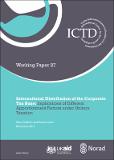| dc.contributor.author | Cobham, Alex | |
| dc.contributor.author | Loretz, Simon | |
| dc.date.accessioned | 2016-04-11T12:46:01Z | |
| dc.date.available | 2016-04-11T12:46:01Z | |
| dc.date.issued | 2014-11 | |
| dc.identifier.citation | Cobham, A. and Loretz, S. (2014) International Distribution of the Corporate Tax Base: Implications of Different Apportionment Factors under Unitary Taxation. ICTD Working Paper 27. Brighton: IDS. | en |
| dc.identifier.isbn | 978-1-78118-178-2 | |
| dc.identifier.uri | https://opendocs.ids.ac.uk/opendocs/handle/20.500.12413/11176 | |
| dc.description | corporate tax reform; multinational taxation; formula apportionment;
unitary taxation; base erosion; profit shifting; BEPS. | en |
| dc.description.abstract | Under the current system of separate accounting, tax-motivated international profit shifting
results in misalignment of profits and real economic activity. While the Organisation for
Economic Co-operation and Development (OECD) Base Erosion and Profit Shifting initiative aims to measure and curtail this, critics claim serious progress is only possible with greater emphasis on formulary apportionment methods (Picciotto 2013), or other methods outside the present international tax architecture (IMF 2014). In this paper we use the leading global database of company balance sheets to compare the distribution of profit and potential apportionment factors. Although data coverage is problematic for developing countries, we find that apportioning profit according to measures of actual economic activity would result in a major redistribution of the tax base at the expense of a particular group of jurisdictions, and in most cases towards the lower-income countries in the sample. International loss consolidation facilitated by a global switch to unitary taxation would reduce the overall tax base by around 12 per cent. | en |
| dc.description.sponsorship | DfID, NORAD | en |
| dc.language.iso | en | en |
| dc.publisher | Institute of Development Studies | en |
| dc.relation.ispartofseries | ICTD Working Paper;27 | |
| dc.rights | International Distribution of the Corporate Tax Base: Implications of Different Apportionment Factors under Unitary Taxation
Alex Cobham and Simon Loretz
ICTD Working Paper 27
First published by the Institute of Development Studies in November 2014
© Alex Cobham and Simon Loretz 2014
ISBN: 978-1-78118-178-2
The authors of this paper grant to the IDS and the ICTD a perpetual, irrevocable, worldwide, royalty-free, non-exclusive licence,
or sublicence, to reproduce, communicate to the public, use, adapt, publish, distribute, display and transmit the work in any and
all media, and to sublicense others (including the Crown) to reproduce, communicate to the public, use, adapt, publish,
distribute, display and transmit the work in any and all media, for non-commercial purposes and with appropriate credit being
given to the authors and ICTD funders.
A catalogue record for this publication is available from the British Library.
This work has been licensed by the copyright holder for distribution in electronic format via any medium for the lifetime of the
OpenDocs repository for the purpose of free access without charge and can be found at http://opendocs.ids.ac.uk/opendocs/
Also available from:
International Centre for Tax and Development,
Institute of Development Studies,
Brighton BN1 9RE, UK
Tel: +44 (0) 1273 606261 Fax: +44 (0) 1273 621202
E-mail: info@ictd.ac
Web: www.ictd.ac
IDS is a charitable company limited by guarantee and registered in England (No. 877338) | en |
| dc.rights.uri | http://www.ids.ac.uk/files/dmfile/IDSOpenDocsStandardTermsOfUse.pdf | en |
| dc.subject | Economic Development | en |
| dc.title | International Distribution of the Corporate Tax Base: Implications of Different Apportionment Factors under Unitary Taxation | en |
| dc.type | IDS Working Paper | en |
| dc.rights.holder | © Alex Cobham and Simon Loretz 2014 | en |
| dc.identifier.externaluri | http://www.ictd.ac/publication/2-working-papers/20-international-distribution-of-the-corporate-tax-base-implications-of-different-apportionment-factors-under-unitary-taxation | en |

